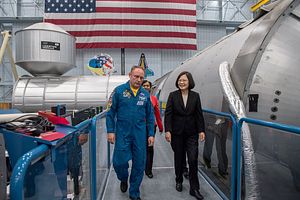Don’t let it pass you by: for the first time since the United States and the People’s Republic of China normalized diplomatic relations, a sitting Taiwanese president entered a U.S. federal government building in an official capacity. Taiwanese President Tsai Ing-wen, in the United States on a closely scrutinized trip, visited the U.S. National Aeronautics and Space Administration’s (NASA) Johnson Space Center in Texas.
What seemed like a minor gesture is likely to be anything but that. China has closely watched as the Trump administration has shored up the United States’ relationship with Taiwan. Under the United States’ “One China” policy, following the normalization of U.S.-PRC ties in 1979, Washington recognized the government in Beijing and, while it acknowledged that Beijing makes a claim to Taiwan, it did not recognize PRC sovereignty over the island. (Critically, the United States also did not — and does not — accept Taiwan’s sovereignty.) Relations with Taipei, beginning in 1979, were governed under the Taiwan Relations Act and successive U.S. administrations since Reagan have maintained close ties with Taiwan.
Tsai’s tour of the NASA facility comes months after the Taiwan Travel Act became law in the United States, encouraging long taboo cabinet-level official visits between Taiwan and the United States. Specifically, the law, which China criticized, “encourages visits between officials of the United States and Taiwan at all levels.” The Taiwan Travel Act, importantly, was passed with the unanimous consent of both the U.S. House of Representatives and the Senate, indicating widespread bipartisan support for Taiwan.
It also comes in the wake of the United States opening a new $255 million building containing the American Institute in Taiwan — Washington’s de facto embassy in the country — earlier this summer. Last year, the Trump administration also approved its first significant arms package valued at $1.4 billion for Taiwan, the first such sale since the Obama administration’s last approved package in December 2015.
For Tsai, this simple tour serves as an important boon as Beijing’s campaign to internationally isolate Taipei has picked up steam in recent years. Beginning in 2016 — the year Tsai was democratically elected Taiwan’s president — the so-called diplomatic “trues” between the two Chinas collapsed. Under the truce, informally agreed between the PRC government and the Kuomintang-led former Taiwanese administration of President Ma Ying-jeou, neither Taipei nor Beijing would actively poach each other’s diplomatic partners. Today, in August 2018, just 18 countries afford official recognition to Taipei; four have severed official relations since Tsai took office.
Tsai’s latest trip to the United States not only reaffirms enduring U.S.-Taiwan ties, but will serve as a reminder to Beijing that even as Taiwan grows more isolated, it won’t be losing the benefits of the “robust unofficial relationship” it enjoys with the United States anytime soon.

































